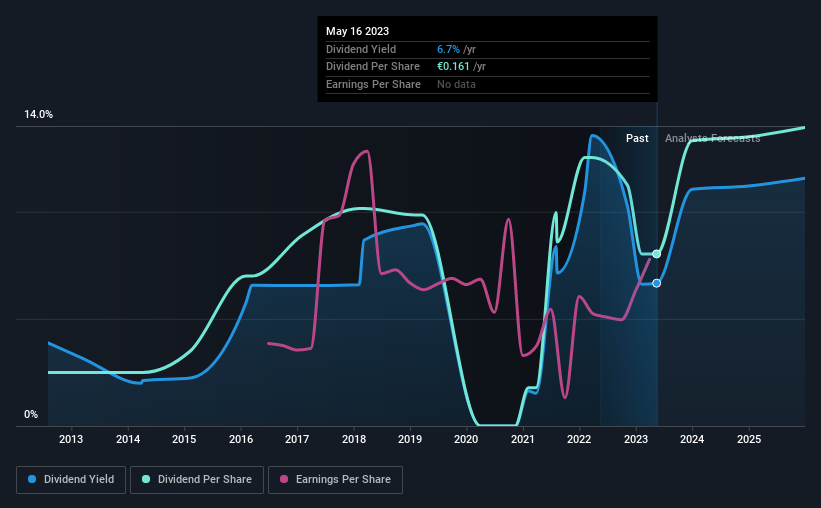Why It Might Not Make Sense To Buy Intesa Sanpaolo S.p.A. (BIT:ISP) For Its Upcoming Dividend

It looks like Intesa Sanpaolo S.p.A. (BIT:ISP) is about to go ex-dividend in the next four days. The ex-dividend date occurs one day before the record date which is the day on which shareholders need to be on the company's books in order to receive a dividend. It is important to be aware of the ex-dividend date because any trade on the stock needs to have been settled on or before the record date. Accordingly, Intesa Sanpaolo investors that purchase the stock on or after the 22nd of May will not receive the dividend, which will be paid on the 24th of May.
The company's next dividend payment will be €0.087 per share, on the back of last year when the company paid a total of €0.16 to shareholders. Looking at the last 12 months of distributions, Intesa Sanpaolo has a trailing yield of approximately 6.7% on its current stock price of €2.41. Dividends are an important source of income to many shareholders, but the health of the business is crucial to maintaining those dividends. That's why we should always check whether the dividend payments appear sustainable, and if the company is growing.
See our latest analysis for Intesa Sanpaolo
Dividends are typically paid out of company income, so if a company pays out more than it earned, its dividend is usually at a higher risk of being cut. Intesa Sanpaolo paid out 71% of its earnings to investors last year, a normal payout level for most businesses.
Generally speaking, the lower a company's payout ratios, the more resilient its dividend usually is.
Click here to see the company's payout ratio, plus analyst estimates of its future dividends.

Have Earnings And Dividends Been Growing?
When earnings decline, dividend companies become much harder to analyse and own safely. If business enters a downturn and the dividend is cut, the company could see its value fall precipitously. Readers will understand then, why we're concerned to see Intesa Sanpaolo's earnings per share have dropped 7.2% a year over the past five years. When earnings per share fall, the maximum amount of dividends that can be paid also falls.
Another key way to measure a company's dividend prospects is by measuring its historical rate of dividend growth. Since the start of our data, 10 years ago, Intesa Sanpaolo has lifted its dividend by approximately 12% a year on average. Growing the dividend payout ratio while earnings are declining can deliver nice returns for a while, but it's always worth checking for when the company can't increase the payout ratio any more - because then the music stops.
To Sum It Up
From a dividend perspective, should investors buy or avoid Intesa Sanpaolo? Earnings per share have been declining and the company is paying out more than half its profits to shareholders; not an enticing combination. Intesa Sanpaolo doesn't appear to have a lot going for it, and we're not inclined to take a risk on owning it for the dividend.
With that in mind though, if the poor dividend characteristics of Intesa Sanpaolo don't faze you, it's worth being mindful of the risks involved with this business. For example - Intesa Sanpaolo has 1 warning sign we think you should be aware of.
Generally, we wouldn't recommend just buying the first dividend stock you see. Here's a curated list of interesting stocks that are strong dividend payers.
New: AI Stock Screener & Alerts
Our new AI Stock Screener scans the market every day to uncover opportunities.
• Dividend Powerhouses (3%+ Yield)
• Undervalued Small Caps with Insider Buying
• High growth Tech and AI Companies
Or build your own from over 50 metrics.
Have feedback on this article? Concerned about the content? Get in touch with us directly. Alternatively, email editorial-team (at) simplywallst.com.
This article by Simply Wall St is general in nature. We provide commentary based on historical data and analyst forecasts only using an unbiased methodology and our articles are not intended to be financial advice. It does not constitute a recommendation to buy or sell any stock, and does not take account of your objectives, or your financial situation. We aim to bring you long-term focused analysis driven by fundamental data. Note that our analysis may not factor in the latest price-sensitive company announcements or qualitative material. Simply Wall St has no position in any stocks mentioned.
About BIT:ISP
Intesa Sanpaolo
Provides various financial products and services primarily in Italy.
Established dividend payer with adequate balance sheet.
Similar Companies
Market Insights
Community Narratives



